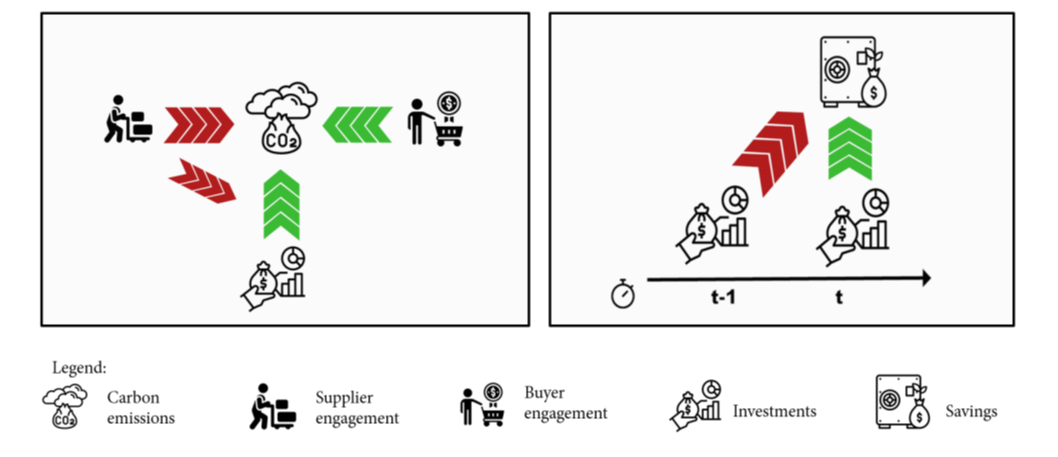One of our studies showed that firms around the world until 2018 did not do enough in terms of challenging climate change, and that sustainability still needs to gain more relevance: if the goals regarding carbon emission abatement (Net Zero Emissions by 2050) want to be met, climate change must be a primary target.
Overall, this study concluded that supply chain collaboration needs to be improved and better align climate-change-related targets between buyer and supplier to achieve consistent and meaningful results. Riveting is the results concerning the relations between climate-change-related investments and savings as they appear to be fluctuating over time, confirming the concerns that firms are still lagging in achieving sustainability best practices.
But why should firms be concerned about managing their supply chain for sustainability and climate change? For at least two reasons: firstly, today climate change has become a hot topic and a concern for a large customer base, particularly thaks to the Fridays for Future protest movement, led by Greta Thunberg, to raise awareness and interest on the topic, which had been overlooked long enough. Actually, interest in sustainability was raised in 2005, in correspondence with the Kyoto Protocol admission of the reality of global warming, but became significant at the end of the first decade of the 2000:
“At nearly the same time [of the UN Climate Summit (2009)] some major industrial catastrophes occurred, including the BP Gulf of Mexico oil spill (2010) and the Fukushima Daiichi nuclear power plant disaster (2011). These industrial accidents presented global economic, environmental, and social damages, and the world became aware that the impacts from these disasters would last for multiple decades. These incidents may have increased scholarly attention towards sustainable supply chain management,” says A. Rajeev, lead author of a review on the evolution of sustainability in supply chain.
At nearly the same time [of the UN Climate Summit (2009)] some major industrial catastrophes occurred, including the BP Gulf of Mexico oil spill (2010) and the Fukushima Daiichi nuclear power plant disaster (2011). These industrial accidents presented global economic, environmental, and social damages, and the world became aware that the impacts from these disasters would last for multiple decades. These incidents may have increased scholarly attention towards sustainable supply chain management
After 2005, firms began reporting non-financial information, such as GHG (Green House Gas) emissions, usage of renewable energy, and diversity and inclusiveness of their personnel. These firms received particular attention and support from investors, buyers, and suppliers to implement new business models to integrate the novel sustainable targets, beign the first movers of supply chain corporate sutainabilty (more information here). The second reason for why frims should be concerned about sustainability is that the disclosure of non-financial information is becoming more frequently a selection criterion to participate in supply chains and markets (more information here): those who do not engage in this practice are autonally negated the business activity. On this matter:
“Some [investors] screen out poor ESG [Environmental, Social and Governance] performers, assuming that the factors that cause companies to receive low ESG ratings will result in weak financial results. Some seek out high ESG performers, expecting exemplary ESG behaviors to drive superior financial results,” says George Serafeim, professor at the Harvard Business School.
Some [investors] screen out poor ESG [Environmental, Social and Governance] performers, assuming that the factors that cause companies to receive low ESG ratings will result in weak financial results. Some seek out high ESG performers, expecting exemplary ESG behaviors to drive superior financial results
More information about our study (results depicted in Figure 1)
The mentioned study was developed utilising data provided by Carbon Disclosure Project (CDP). CDP is a rater of sustability founded in 2002 that today it is regarded as the world’s largest database on climate-change-related data (more information here), gathering nearly $100tn of partners investor assets, nearly 10.000 reporting companies, more than 800 reporting cities (more information here). Since 2012, investors and experts recognise it as one of the best environmental ratings for its quality and usefulness (see the ratings here). CDP proposes several disclosure programs to address general climate change management, water security, forest security, and general climate change with a supply chain perspective (Supply Chain Program – SCP). Each participant to any of these programs can decide whether to respond publicly, agreeing to the publication of its questionnaire on CDP’s website, or respond privately so that only its buyers and suppliers could access the questionnaire.
The sample comprised 1,311 listed firm based in 42 different countries for the yars 2013-2018. Click here to browse a dashboard describing firms.

Figure 1 - Study results
